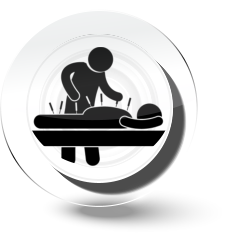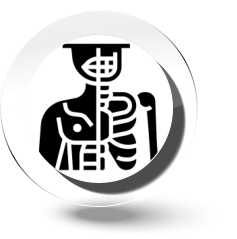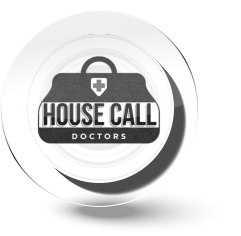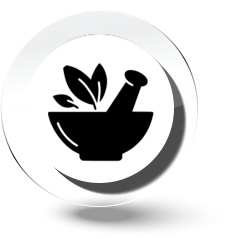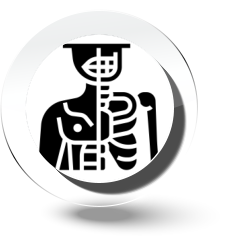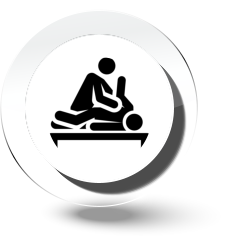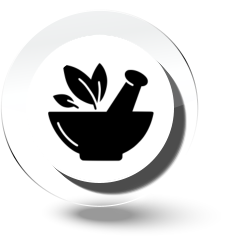

Business Hours
We are still getting established,
Contact Us for an Appointment!
137 North Main Street,
Cedar City, UT 84720
David Dalton, DO
Osteopathic Neuromusculoskeletal Medicine (NERVES, MUSCLES, BONES)
A neuromusculoskeletal medicine (NMM) doctor is a doctor of osteopathic medicine (DO) who specializes in using hands-on, osteopathic evaluation and manipulative medicine to treat a variety of physical and mental conditions. NMM doctors focus on the relationship between your health and your neuromusculoskeletal system (nerves, muscles, bones, skull and spine). All DOs learn the fundamentals of osteopathic manipulative treatment (OMT) in medical school before pursuing their residency in a variety of different specialties, such as family medicine or internal medicine. However, a DO who pursues a residency in neuromusculoskeletal medicine (NMM) and osteopathic manipulative medicine (OMM) has a deeper understanding of applying OMT to patients with a broad range of conditions, from acid reflux to arthritis to depression. An NMM doctor typically: • Evaluates a patient’s medical history and educates the patient about wellness and disease prevention • Performs a physical exam with particular attention to bone, muscle and nerve alignment • Orders and interprets laboratory and imaging tests and prescribes medications • Diagnoses, treats and monitors a range of acute and chronic diseases and conditions, such as high blood pressure, diabetes, cancer, depression, and osteoporosis • Performs osteopathic, hands-on manipulations • Provides ongoing care in an office, clinic, hospital, or long-term care facility • Collaborates closely with other specialists and members of a patient’s healthcare team to provide optimal care An NMM doctor may also be known by the following names: neuromuscular doctor; neuromusculoskeletal doctor; Doctor of Osteopathic Medicine; DO; NMM/OMM doctor; and DO, C-NMM/OMM (doctor of osteopathic medicine, certified-neuromusculoskeletal medicine/osteopathic manipulative medicine). Who should see a neuromusculoskeletal medicine doctor? People of all ages see NMM doctors for a range of medical conditions. People who may benefit most from seeing a neuromusculoskeletal medicine (NMM) doctor include those who prefer a hands-on approach to healthcare that promotes healing from within the body. In addition to using their hands (osteopathic manipulative treatment, or OMT) for diagnosis and treatment, NMM doctors use medication and other techniques when other methods have failed or are not effective. The expertise of an NMM doctor in using his or her hands to detect structural abnormalities in the body as it relates to function is particularly well suited for those patients with acute and chronic pain due to illness or surgery. When should you see a neuromusculoskeletal medicine doctor? Consider seeking care from a qualified neuromusculoskeletal medicine (NMM) doctor if you need routine medical care or have a disease or disorder that requires ongoing care. You can also see an NMM doctor if you or a loved one develop any of the following symptoms or conditions including: • Abnormal fatigue • Chronic or acute pain due to injury, disease, surgery, pregnancy, or menstrual cramping • Colic • Difficulty urinating, bloody urine, painful urination, or vaginal discharge • Digestive problems, such as blood in your stools; acid reflux; or vomiting, diarrhea or constipation that last for more than a few days • High-risk behaviors including excessive use of alcohol or illegal drugs and high-risk sexual behaviors, such as multiple sexual partners and not using condoms • Headaches that occur frequently and are accompanied by other symptoms, such as fever and coughing • Mild wheezing or shortness of breath (You should seek immediate emergency care for moderate to severe shortness of breath, or call 911.) • Sore throat, earache, or cough • Unusual anxiety, stress, sadness or other emotional problems What conditions and diseases does a neuromusculoskeletal medicine doctor treat? A neuromusculoskeletal medicine doctor can treat a full spectrum of diseases and medical conditions including: • Chronic pain including back and neck pain, tension headaches, migraine headaches, stomach pain, and fibromyalgia • Digestive tract conditions including stomach ulcers, irritable bowel syndrome (IBS), inflammatory bowel disease (IBD), and gastroesophageal reflux disease (GERD) • Genitourinary conditions including urinary incontinence, urinary tract infections, sexually transmitted diseases (STDs), prostate problems, and kidney stones • Infections including the common cold, strep throat, ear infection, influenza, and tuberculosis • Mental, emotional and behavioral conditions and disorders including depression, social anxiety, substance abuse, and addiction • Musculoskeletal conditions including osteoporosis, arthritis, sciatica, carpal tunnel syndrome, muscle strains, and ligament sprains • Neuromuscular conditions including multiple sclerosis, muscular dystrophy, and amyotrophic lateral sclerosis (ALS, or Lou Gehrig’s disease) • Respiratory conditions including asthma, lung cancer, pneumonia, and chronic obstructive pulmonary disease (COPD) What tests does an a neuromusculoskeletal medicine doctor perform or order? A neuromusculoskeletal medicine doctor can order or perform a wide variety of diagnostic and screening tests including: • General health tests including complete blood count (CBC), urinalysis, blood glucose (sugar) test, electrolyte tests, liver and kidney function tests, cholesterol panel, thyroid hormone tests, EKG, blood oxygen level (pulse oximetry), and blood pressure screening • Cancer screening including breast exam, mammogram, Pap test, rectal exam, and fecal occult blood test (to look for blood in stool) • Imaging tests including X-ray, ultrasound, computed tomography (CT) scans, endoscopy, magnetic resonance imaging (MRI), and nuclear scans • Mental health screening for depression, anxiety, obsessive-compulsive disorder, and bipolar disorder • Physical exam including a manual, hands-on analysis of your posture, spine and balance What procedures and treatments does a neuromusculoskeletal medicine doctor perform or order? A neuromusculoskeletal medicine (NMM) doctor specializes in using osteopathic manipulative treatment (OMT) to treat illness and disease. The premise of OMT is that the body’s structure is intimately connected to how well it functions. NMM doctors use their hands to manipulate soft tissue as well as the deep muscles, underlying fascia, ligaments, and bones with the intention of restoring normal function throughout the body. OMT promotes healing by balancing the circulatory, immune and lymphatic systems with the neuromuscular and skeletal systems. An NMM doctor uses OMT to: • Promote circulation • Restore motion and flexibility • Promote healing from within the body OMT includes the following techniques: • Myofascial release: massage to release tightness in the fascia, which is the connective tissue surrounding your internal body structures (muscles, organs, joints) • Soft tissue massage: therapeutic massage to release muscle tension • Strain and counterstrain therapy: a gentle, positional technique that uses patient involvement to correct neuromuscular problems such as a muscle spasm • Craniosacral therapy: light touches to the skull and facial bones, spine, and pelvis to improve the flow of cerebrospinal fluid and release tension NMM doctors also use other types of treatment, including medication, when OMT is not enough. NMM doctors refer patients to other specialists as needed, such as an orthopedic surgeon for treatment of severe arthritis that has destroyed joint function and movement. Neuromusculoskeletal medicine doctor training and certification A doctor may practice neuromusculoskeletal medicine (NMM) without becoming board certified in the specialty. However, education, training, experience and certification are key elements in establishing a doctor’s level of competence. Board certification by the American Osteopathic Board of Neuromusculoskeletal Medicine verifies that an NMM doctor has completed specialized training and has passed competency examinations. NMM is one of many different specialties offered by the American Osteopathic Association (AOA). A board-certified NMM doctor has: • Completed four years of education at a U.S. osteopathic medical college • Completed a two-year residency in NMM and osteopathic manipulative medicine, also called NMM/OMM • Passed a state licensing exam that validates the doctor’s knowledge and skills An osteopathic medical school graduate can also combine his or her NMM/OMM training with other AOA-approved specialties, such as obstetrics and gynecology, surgery, dermatology, and emergency medicine, to name a few.

The Country Doc Shop



Business Hours
We are still getting established,
Contact Us for an Appointment!
Serving Iron County &
Washington County & all of
Southern Utah
David Dalton, DO


The Country Doc Shop

Osteopathic
Neuromusculoskeletal
Medicine (NERVES, MUSCLES,
BONES)
A neuromusculoskeletal medicine (NMM) doctor is a doctor of osteopathic medicine (DO) who specializes in using hands-on, osteopathic evaluation and manipulative medicine to treat a variety of physical and mental conditions. NMM doctors focus on the relationship between your health and your neuromusculoskeletal system (nerves, muscles, bones, skull and spine). All DOs learn the fundamentals of osteopathic manipulative treatment (OMT) in medical school before pursuing their residency in a variety of different specialties, such as family medicine or internal medicine. However, a DO who pursues a residency in neuromusculoskeletal medicine (NMM) and osteopathic manipulative medicine (OMM) has a deeper understanding of applying OMT to patients with a broad range of conditions, from acid reflux to arthritis to depression. An NMM doctor typically: • Evaluates a patient’s medical history and educates the patient about wellness and disease prevention • Performs a physical exam with particular attention to bone, muscle and nerve alignment • Orders and interprets laboratory and imaging tests and prescribes medications • Diagnoses, treats and monitors a range of acute and chronic diseases and conditions, such as high blood pressure, diabetes, cancer, depression, and osteoporosis • Performs osteopathic, hands-on manipulations • Provides ongoing care in an office, clinic, hospital, or long-term care facility • Collaborates closely with other specialists and members of a patient’s healthcare team to provide optimal care An NMM doctor may also be known by the following names: neuromuscular doctor; neuromusculoskeletal doctor; Doctor of Osteopathic Medicine; DO; NMM/OMM doctor; and DO, C-NMM/OMM (doctor of osteopathic medicine, certified- neuromusculoskeletal medicine/osteopathic manipulative medicine). Who should see a neuromusculoskeletal medicine doctor? People of all ages see NMM doctors for a range of medical conditions. People who may benefit most from seeing a neuromusculoskeletal medicine (NMM) doctor include those who prefer a hands-on approach to healthcare that promotes healing from within the body. In addition to using their hands (osteopathic manipulative treatment, or OMT) for diagnosis and treatment, NMM doctors use medication and other techniques when other methods have failed or are not effective. The expertise of an NMM doctor in using his or her hands to detect structural abnormalities in the body as it relates to function is particularly well suited for those patients with acute and chronic pain due to illness or surgery. When should you see a neuromusculoskeletal medicine doctor? Consider seeking care from a qualified neuromusculoskeletal medicine (NMM) doctor if you need routine medical care or have a disease or disorder that requires ongoing care. You can also see an NMM doctor if you or a loved one develop any of the following symptoms or conditions including: • Abnormal fatigue • Chronic or acute pain due to injury, disease, surgery, pregnancy, or menstrual cramping • Colic • Difficulty urinating, bloody urine, painful urination, or vaginal discharge • Digestive problems, such as blood in your stools; acid reflux; or vomiting, diarrhea or constipation that last for more than a few days • High-risk behaviors including excessive use of alcohol or illegal drugs and high-risk sexual behaviors, such as multiple sexual partners and not using condoms • Headaches that occur frequently and are accompanied by other symptoms, such as fever and coughing • Mild wheezing or shortness of breath (You should seek immediate emergency care for moderate to severe shortness of breath, or call 911.) • Sore throat, earache, or cough • Unusual anxiety, stress, sadness or other emotional problems What conditions and diseases does a neuromusculoskeletal medicine doctor treat? A neuromusculoskeletal medicine doctor can treat a full spectrum of diseases and medical conditions including: • Chronic pain including back and neck pain, tension headaches, migraine headaches, stomach pain, and fibromyalgia • Digestive tract conditions including stomach ulcers, irritable bowel syndrome (IBS), inflammatory bowel disease (IBD), and gastroesophageal reflux disease (GERD) • Genitourinary conditions including urinary incontinence, urinary tract infections, sexually transmitted diseases (STDs), prostate problems, and kidney stones • Infections including the common cold, strep throat, ear infection, influenza, and tuberculosis • Mental, emotional and behavioral conditions and disorders including depression, social anxiety, substance abuse, and addiction • Musculoskeletal conditions including osteoporosis, arthritis, sciatica, carpal tunnel syndrome, muscle strains, and ligament sprains • Neuromuscular conditions including multiple sclerosis, muscular dystrophy, and amyotrophic lateral sclerosis (ALS, or Lou Gehrig’s disease) • Respiratory conditions including asthma, lung cancer, pneumonia, and chronic obstructive pulmonary disease (COPD) What tests does an a neuromusculoskeletal medicine doctor perform or order? A neuromusculoskeletal medicine doctor can order or perform a wide variety of diagnostic and screening tests including: • General health tests including complete blood count (CBC), urinalysis, blood glucose (sugar) test, electrolyte tests, liver and kidney function tests, cholesterol panel, thyroid hormone tests, EKG, blood oxygen level (pulse oximetry), and blood pressure screening • Cancer screening including breast exam, mammogram, Pap test, rectal exam, and fecal occult blood test (to look for blood in stool) • Imaging tests including X-ray, ultrasound, computed tomography (CT) scans, endoscopy, magnetic resonance imaging (MRI), and nuclear scans • Mental health screening for depression, anxiety, obsessive-compulsive disorder, and bipolar disorder • Physical exam including a manual, hands-on analysis of your posture, spine and balance What procedures and treatments does a neuromusculoskeletal medicine doctor perform or order? A neuromusculoskeletal medicine (NMM) doctor specializes in using osteopathic manipulative treatment (OMT) to treat illness and disease. The premise of OMT is that the body’s structure is intimately connected to how well it functions. NMM doctors use their hands to manipulate soft tissue as well as the deep muscles, underlying fascia, ligaments, and bones with the intention of restoring normal function throughout the body. OMT promotes healing by balancing the circulatory, immune and lymphatic systems with the neuromuscular and skeletal systems. An NMM doctor uses OMT to: • Promote circulation • Restore motion and flexibility • Promote healing from within the body OMT includes the following techniques: • Myofascial release: massage to release tightness in the fascia, which is the connective tissue surrounding your internal body structures (muscles, organs, joints) • Soft tissue massage: therapeutic massage to release muscle tension • Strain and counterstrain therapy: a gentle, positional technique that uses patient involvement to correct neuromuscular problems such as a muscle spasm • Craniosacral therapy: light touches to the skull and facial bones, spine, and pelvis to improve the flow of cerebrospinal fluid and release tension NMM doctors also use other types of treatment, including medication, when OMT is not enough. NMM doctors refer patients to other specialists as needed, such as an orthopedic surgeon for treatment of severe arthritis that has destroyed joint function and movement. Neuromusculoskeletal medicine doctor training and certification A doctor may practice neuromusculoskeletal medicine (NMM) without becoming board certified in the specialty. However, education, training, experience and certification are key elements in establishing a doctor’s level of competence. Board certification by the American Osteopathic Board of Neuromusculoskeletal Medicine verifies that an NMM doctor has completed specialized training and has passed competency examinations. NMM is one of many different specialties offered by the American Osteopathic Association (AOA). A board-certified NMM doctor has: • Completed four years of education at a U.S. osteopathic medical college • Completed a two-year residency in NMM and osteopathic manipulative medicine, also called NMM/OMM • Passed a state licensing exam that validates the doctor’s knowledge and skills An osteopathic medical school graduate can also combine his or her NMM/OMM training with other AOA-approved specialties, such as obstetrics and gynecology, surgery, dermatology, and emergency medicine, to name a few.

















